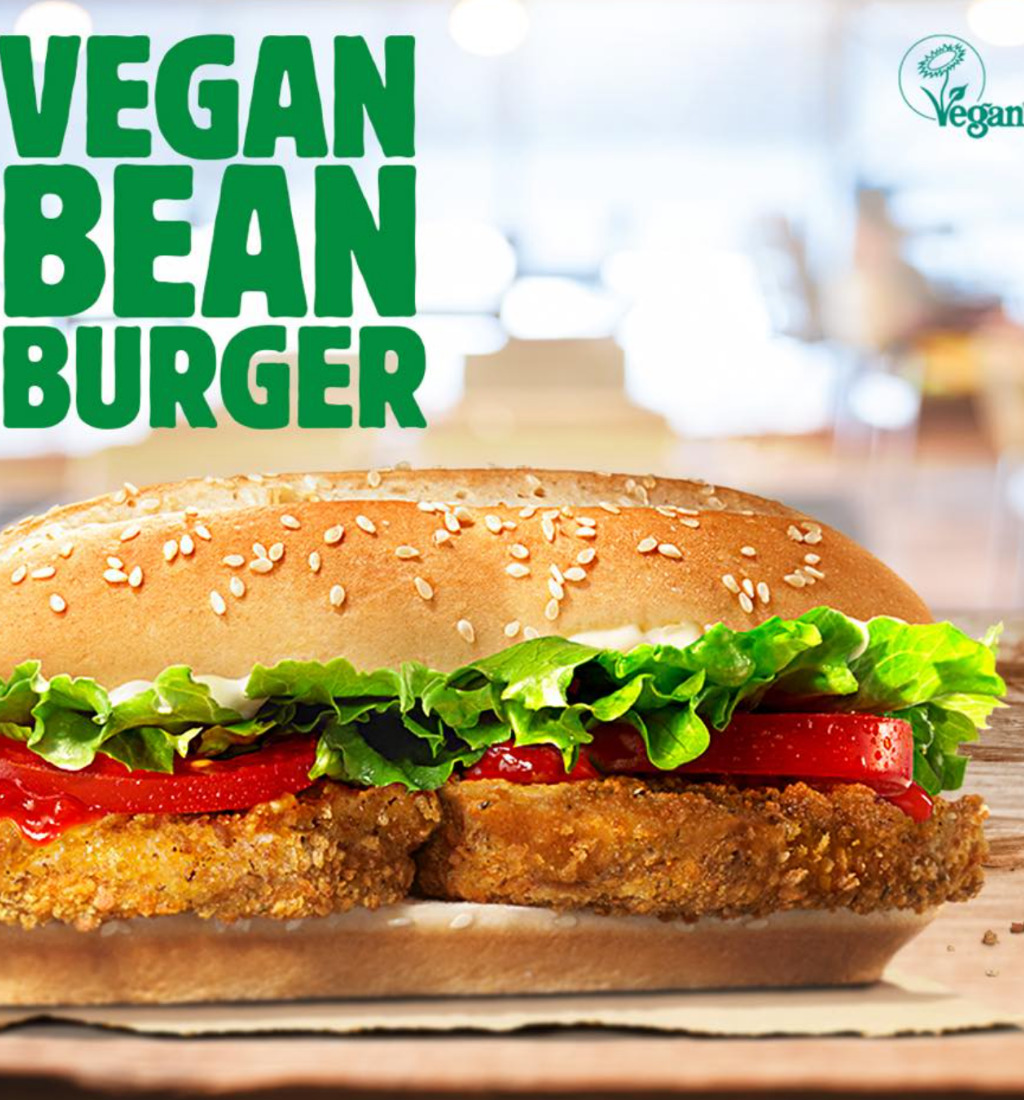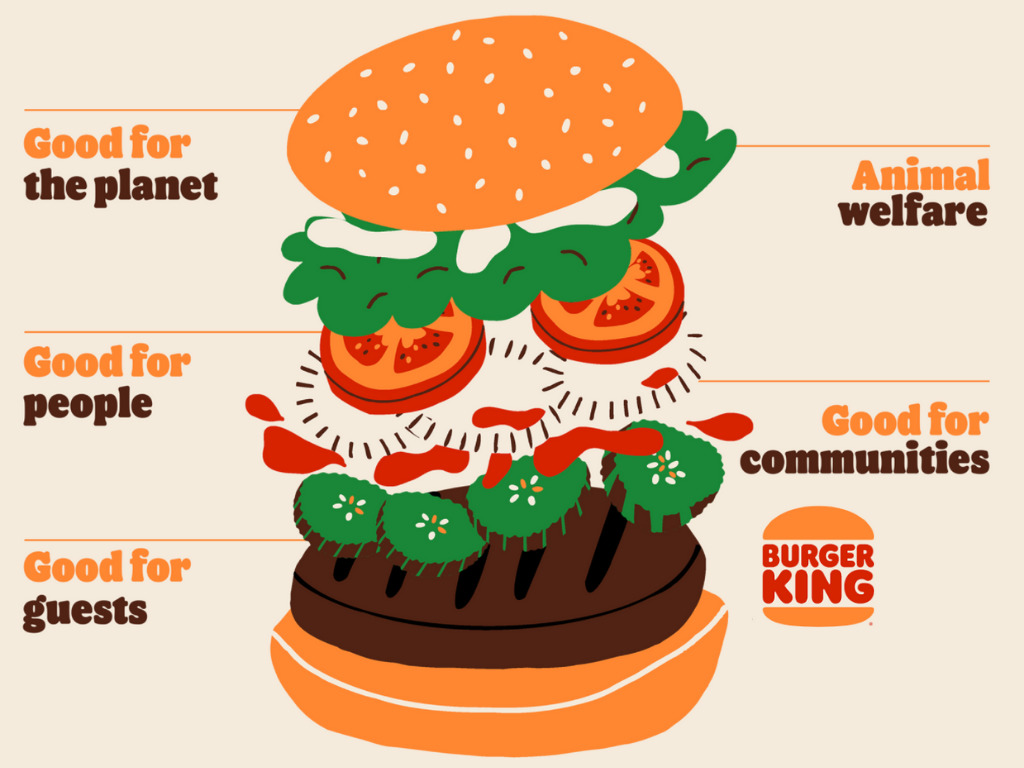4 Mins Read
In line with its long-term commitment to reduce its carbon footprint, Burger King U.K. has recently announced that it will launch vegan and vegetarian burgers, for instance, a plant-based version of its chicken ‘Royale’ burger in the coming weeks thus selling fewer beef options.
In an attempt to negate the effects of climate change, fast food giant Burger King U.K. has decided to reduce beef on its menus and introduce more plant-based versions of its products at all 530 locations in the country.
Owned by Bridgepoint and led by Alasdair Murdoch, Burger King U.K. is the second largest quick service restaurant (QSR) chain in the country.
The inclusion of plant-based menu items comes as a part of the chain’s new sustainability charter titled Burger King for Good in an effort to match its practices with the Sustainable Development Goals (SDGs).
Last year, the company had unveiled a plant-based ‘Rebel Whopper’ burger but due to pandemic, it was unable to follow social distancing norms, and had to drop it. Further, while adverts claimed the Rebel Whopper was vegan, in reality, it had egg-based mayonnaise and was prepared alongside meat burgers. However, this time, the company made assurances that the new plant-based Whopper would be made suitable for vegans.
In an interview with i, Murdoch said: “A new plant-based Whopper would appear on menus in the coming weeks as restrictions lift, alongside a plant-based ‘Royale’ burger. Meat-free nuggets are also in the pipeline.”
Though Burger King U.K. is more famous for its beef burgers, sourcing its meat from the U.K. and Ireland, in the coming future, several beef options will be dropped. Over time, the volume of beef that the chain will sell will drastically reduce and within a decade, up to 50% of Burger King U.K.’s menu could be plant-based.

Being good to the planet, our people and guests is central to our values at Burger King U.K., and despite the challenges faced by the pandemic, I believe this crisis has given us an opportunity to ‘build back better’ and drive through our company values, which are integral to sustaining our business for the future. The underlying aim of the Burger King for Good initiative is to be transparent, be accountable and work with others to ensure our business decisions are well informed and sound
Alasdair Murdoch, CEO of Burger King U.K.
However, Murdoch was clear that the burger chain is not committing to ditching beef completely.“ We know the direction of travel, we are embracing the direction of travel and we are trying to get ahead of it. But we are also still very proud of our beef.”
As to whether the chain would explore lab-grown meat, the company said it would wait for costs to fall and for the technology to be successfully scalable. They added that in their view, it will be a long time until customers accept cellular beef.
In the charter, the chain has committed to reduce 30% of its food waste, and source 100% sustainable soy, timber, coffee, palm oil, tea, and paper. Furthermore, it plans to combat waste by embracing campaign group WRAP’s food waste plan and will ban single-use plastic and will instead opt for 100% recycled or certified packaging by 2025. The charter also showed its support for animal welfare and diversity throughout Burger King’s supply chain.
Murdoch added that being good to the planet, the people and guests is central to their values at Burger King U.K.: “Despite the challenges faced by the pandemic, I believe this crisis has given us an opportunity to ‘build back better’ and drive through our company values, which are integral to sustaining our business for the future. The underlying aim of the Burger King for Good initiative is to be transparent, be accountable and work with others to ensure our business decisions are well informed and sound.”
This news comes shortly after Burger King outlets across the world have begun rolling out plant-based Whoppers, to cater to an increasing number of sustainable consumers, including in Japan, South Korea and most recently Thailand. The chain also made global headlines when it teamed up with Impossible Foods back in 2019 to launch the Impossible Whopper across U.S. locations. It also debuted plant-based options with Unilever acquisition The Vegetarian Butcher in Europe and mainland China. Further Yum Brands, the owner of Burger King U.S., signed a multi-year partnership with Beyond Meat last week.
Several other food chains are hopping on the bandwagon of meatless offerings with KFC joining forces with Beyond Meat, Quorn, & Lightlife, while Pizza Hut partnered with Beyond Meat to bring plant-based meat pizzas across the U.S.
McDonald’s too took this trend a notch higher and developed its own-brand meatless line called McPlant with the burgers presently being trialled in Denmark and Sweden, before a wider roll-out in other markets.
Lead image courtesy of Burger King U.K.




